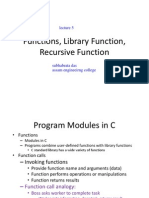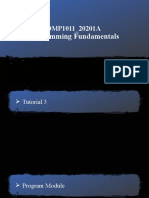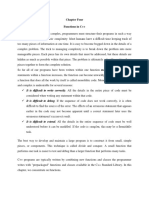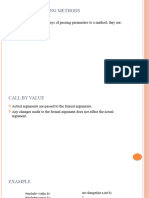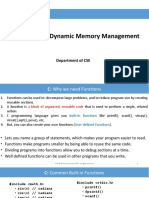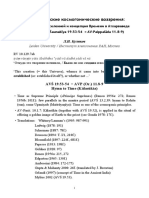The Standard Library Functions
Uploaded by
Jag DeshThe Standard Library Functions
Uploaded by
Jag DeshThe Standard Library Functions
Some of the "commands" in C are not really "commands" at all but are functions. For example, we have been using printf and scanf to do input and output, and we have used rand to generate random numbers - all three are functions. There are a great many standard functions that are included with C compilers and while these are not really part of the language, in the sense that you can re-write them if you really want to, most C programmers think of them as fixtures and fittings. Later in the course we will look into the mysteries of how C gains access to these standard functions and how we can extend the range of the standard library. But for now a list of the most common libraries and a brief description of the most useful functions they contain follows: 1. stdio.h: I/O functions: 1. getchar() returns the next character typed on the keyboard. 2. putchar() outputs a single character to the screen. 3. printf() as previously described 4. scanf() as previously described 2. string.h: String functions 1. strcat() concatenates a copy of str2 to str1 2. strcmp() compares two strings 3. strcpy() copys contents of str2 to str1 3. ctype.h: Character functions 1. isdigit() returns non-0 if arg is digit 0 to 9 2. isalpha() returns non-0 if arg is a letter of the alphabet 3. isalnum() returns non-0 if arg is a letter or digit 4. islower() returns non-0 if arg is lowercase letter 5. isupper() returns non-0 if arg is uppercase letter 4. math.h: Mathematics functions 1. acos() returns arc cosine of arg 2. asin() returns arc sine of arg 3. atan() returns arc tangent of arg 4. cos() returns cosine of arg 5. exp() returns natural logarithim e 6. fabs() returns absolute value of num 7. sqrt() returns square root of num 5. time.h: Time and Date functions 1. time() returns current calender time of system 2. difftime() returns difference in secs between two times 3. clock() returns number of system clock cycles since program execution 6. stdlib.h:Miscellaneous functions
1. malloc() provides dynamic memory allocation, covered in future sections 2. rand() as already described previously 3. srand() used to set the starting point for rand()
Library functions
The C language is accompanied by a number of standard library functions which carry out various useful tasks. In particular, all input and output operations ( e.g., writing to the terminal) and all math operations (e.g., evaluation of sines and cosines) are implemented by library functions. In order to use a library function, it is necessary to call the appropriate header file at the beginning of the program. The header file informs the program of the name, type, and number and type of arguments, of all of the functions contained in the library in question. A header file is called via the preprocessor statement
#include <filename>
where filename represents the name of the header file. A library function is accessed by simply writing the function name, followed by a list of arguments, which represent the information being passed to the function. The arguments must be enclosed in parentheses, and separated by commas: they can be constants, variables, or more complex expressions. Note that the parentheses must be present even when there are no arguments. The C math library has the header file math.h, and contains the following useful functions:
Function -------acos(d) asin(d) atan(d) atan2(d1, d2) cbrt(d) cos(d) cosh(d) exp(d) fabs(d) hypot(d1, d2) Type ---double double double double double double double double double double Purpose ------Return Return Return Return Return Return Return Return Return Return arc cosine of d (in range 0 to pi) arc sine of d (in range -pi/2 to pi/2) arc tangent of d (in range -pi/2 to pi/2) arc tangent of d1/d2 (in range -pi to pi) cube root of d cosine of d hyperbolic cosine of d exponential of d absolute value of d sqrt(d1 * d1 + d2 * d2)
log(d) log10(d) pow(d1, d2) sin(d) sinh(d) sqrt(d) tan(d) tanh(d)
double double double double double double double double
Return Return Return Return Return Return Return Return
natural logarithm of d logarithm (base 10) of d d1 raised to the power d2 sine of d hyperbolic sine of d square root of d tangent of d hyperbolic tangent of d
Here, Type refers to the data type of the quantity that is returned by the function. Moreover, d, d1, etc. indicate arguments of type double. A program that makes use of the C math library would contain the statement
#include x = cos(y); <math.h>
close to its start. In the body of the program, a statement like would cause the variable x to be assigned a value which is the cosine of the value of the variable y (both x and y should be of type double). Note that math library functions tend to be extremely expensive in terms of CPU time, and should, therefore, only be employed when absolutely necessary. The classic illustration of this point is the use of the pow() function. This function assumes that, in general, it will be called with a fractional power, and, therefore, implements a fullblown (and very expensive) series expansion. Clearly, it is not computationally efficient to use this function to square or cube a quantity. In other words, if a quantity needs to be raised to a small, positive integer power then this should be implemented directly, instead of using the pow() function: i.e., we should write x * x rather than pow(x, 2), and x * x * x rather than pow(x, 3), etc. (Of course, a properly designed exponentiation function would realize that it is more efficient to evaluate small positive integer powers by the direct method. Unfortunately, the pow() function was written by computer scientists!) The C math library comes with a useful set of predefined mathematical constants:
Name ---M_PI M_PI_2 M_PI_4 M_1_PI M_SQRT2 M_SQRT1_2 M_E Description ----------Pi, the ratio of a circle's circumference to its diameter. Pi divided by two. Pi divided by four. The reciprocal of pi (1/pi). The square root of two. The reciprocal of the square root of two (also the square root of 1/2). The base of natural logarithms.
Use of Library Functions
To use a function, ensure that you have made the required #includes in your C file. Then the function can be called as though you had defined it yourself. It is important to ensure that your arguments have the expected types, otherwise the function will probably produce strange results. lint is quite good at checking such things. Some libraries require extra options before the compiler can support their use. For example, to compile a program including functions from the math.h library the command might be
cc mathprog.c -o mathprog -lm
The final -lm is an instruction to link the maths library with the program. The manual page for each function will usually inform you if any special compiler flags are required.
You might also like
- Embedded C Programming and The ATMEL AVR 2nd EditionNo ratings yetEmbedded C Programming and The ATMEL AVR 2nd Edition103 pages
- Recursive Form of The Eigensystem Realization Algorithm For System IdentificationNo ratings yetRecursive Form of The Eigensystem Realization Algorithm For System Identification6 pages
- C Library - : S.N. Mac Ro & Desc Ription Huge - Val100% (1)C Library - : S.N. Mac Ro & Desc Ription Huge - Val2 pages
- Be First Year Engineering Semester 2 2022 December C Programming Rev 2019c SchemeNo ratings yetBe First Year Engineering Semester 2 2022 December C Programming Rev 2019c Scheme27 pages
- Computer Fundamentals Notes by Nida Afaq WarsiNo ratings yetComputer Fundamentals Notes by Nida Afaq Warsi7 pages
- Bacus, Mark Gil S HW Module1lab CLibrararyNo ratings yetBacus, Mark Gil S HW Module1lab CLibrarary2 pages
- C++ Header Files and Standard Functions: Assert. You Use Assertwrites An Error Assert #Define NDEBUGNo ratings yetC++ Header Files and Standard Functions: Assert. You Use Assertwrites An Error Assert #Define NDEBUG5 pages
- Structured Programming Language Lab ManualNo ratings yetStructured Programming Language Lab Manual16 pages
- Be - First Year Engineering - Semester 2 - 2023 - December - C Programming Rev 2019c SchemeNo ratings yetBe - First Year Engineering - Semester 2 - 2023 - December - C Programming Rev 2019c Scheme19 pages
- Lab Manual 03: CSC 2207 Programming Language 2 (EEE)No ratings yetLab Manual 03: CSC 2207 Programming Language 2 (EEE)9 pages
- C++ Programming: 11. User-Defined FunctionsNo ratings yetC++ Programming: 11. User-Defined Functions38 pages
- Parameters: Break Into Fractional and Integral PartsNo ratings yetParameters: Break Into Fractional and Integral Parts1 page
- Lecture 4 Library Functions and Header FilesNo ratings yetLecture 4 Library Functions and Header Files15 pages
- Module 1.2 - C Language History and Programming ElementsNo ratings yetModule 1.2 - C Language History and Programming Elements9 pages
- Online Learning: A Panacea in The Time of COVID-19 Crisis: Shivangi DhawanNo ratings yetOnline Learning: A Panacea in The Time of COVID-19 Crisis: Shivangi Dhawan18 pages
- Southern Luzon State University College of Allied Medicine Lucban, QuezonNo ratings yetSouthern Luzon State University College of Allied Medicine Lucban, Quezon4 pages
- (Quiz) History - Free Online Test (10th STD) Chap-11 - TNPSC Guru - TNPSC Todays Latest News TNPSC Vao Result Group 4 - TNPSC100% (1)(Quiz) History - Free Online Test (10th STD) Chap-11 - TNPSC Guru - TNPSC Todays Latest News TNPSC Vao Result Group 4 - TNPSC4 pages
- Society For The Promotion of Roman StudiesNo ratings yetSociety For The Promotion of Roman Studies47 pages
- Hull OFOD10e MultipleChoice Questions Only Ch22No ratings yetHull OFOD10e MultipleChoice Questions Only Ch224 pages
- Gabrito vs. Court of Appeals 167 SCRA 771, November 24, 1988No ratings yetGabrito vs. Court of Appeals 167 SCRA 771, November 24, 198812 pages
- Leiden University / Институт языкознания РАН, Москва: AVŚ 19.53-54 = AVP (Or.) 11.8-9 Hymn to Time (Kālasūkta)No ratings yetLeiden University / Институт языкознания РАН, Москва: AVŚ 19.53-54 = AVP (Or.) 11.8-9 Hymn to Time (Kālasūkta)20 pages
- Tamil Daily Calendar 2024 - 2005 தமிழ் தினசரி கால…No ratings yetTamil Daily Calendar 2024 - 2005 தமிழ் தினசரி கால…1 page
- 02 Child Maltreatment - MedicoLegalConsensus - 3.10-Ver-2No ratings yet02 Child Maltreatment - MedicoLegalConsensus - 3.10-Ver-2116 pages
- XII Application of The Derivatives Assignment100% (1)XII Application of The Derivatives Assignment4 pages
- Embedded C Programming and The ATMEL AVR 2nd EditionEmbedded C Programming and The ATMEL AVR 2nd Edition
- Recursive Form of The Eigensystem Realization Algorithm For System IdentificationRecursive Form of The Eigensystem Realization Algorithm For System Identification
- C Library - : S.N. Mac Ro & Desc Ription Huge - ValC Library - : S.N. Mac Ro & Desc Ription Huge - Val
- Be First Year Engineering Semester 2 2022 December C Programming Rev 2019c SchemeBe First Year Engineering Semester 2 2022 December C Programming Rev 2019c Scheme
- C++ Header Files and Standard Functions: Assert. You Use Assertwrites An Error Assert #Define NDEBUGC++ Header Files and Standard Functions: Assert. You Use Assertwrites An Error Assert #Define NDEBUG
- Be - First Year Engineering - Semester 2 - 2023 - December - C Programming Rev 2019c SchemeBe - First Year Engineering - Semester 2 - 2023 - December - C Programming Rev 2019c Scheme
- Lab Manual 03: CSC 2207 Programming Language 2 (EEE)Lab Manual 03: CSC 2207 Programming Language 2 (EEE)
- Parameters: Break Into Fractional and Integral PartsParameters: Break Into Fractional and Integral Parts
- Module 1.2 - C Language History and Programming ElementsModule 1.2 - C Language History and Programming Elements
- Online Learning: A Panacea in The Time of COVID-19 Crisis: Shivangi DhawanOnline Learning: A Panacea in The Time of COVID-19 Crisis: Shivangi Dhawan
- Southern Luzon State University College of Allied Medicine Lucban, QuezonSouthern Luzon State University College of Allied Medicine Lucban, Quezon
- (Quiz) History - Free Online Test (10th STD) Chap-11 - TNPSC Guru - TNPSC Todays Latest News TNPSC Vao Result Group 4 - TNPSC(Quiz) History - Free Online Test (10th STD) Chap-11 - TNPSC Guru - TNPSC Todays Latest News TNPSC Vao Result Group 4 - TNPSC
- Gabrito vs. Court of Appeals 167 SCRA 771, November 24, 1988Gabrito vs. Court of Appeals 167 SCRA 771, November 24, 1988
- Leiden University / Институт языкознания РАН, Москва: AVŚ 19.53-54 = AVP (Or.) 11.8-9 Hymn to Time (Kālasūkta)Leiden University / Институт языкознания РАН, Москва: AVŚ 19.53-54 = AVP (Or.) 11.8-9 Hymn to Time (Kālasūkta)
- Tamil Daily Calendar 2024 - 2005 தமிழ் தினசரி கால…Tamil Daily Calendar 2024 - 2005 தமிழ் தினசரி கால…
- 02 Child Maltreatment - MedicoLegalConsensus - 3.10-Ver-202 Child Maltreatment - MedicoLegalConsensus - 3.10-Ver-2








